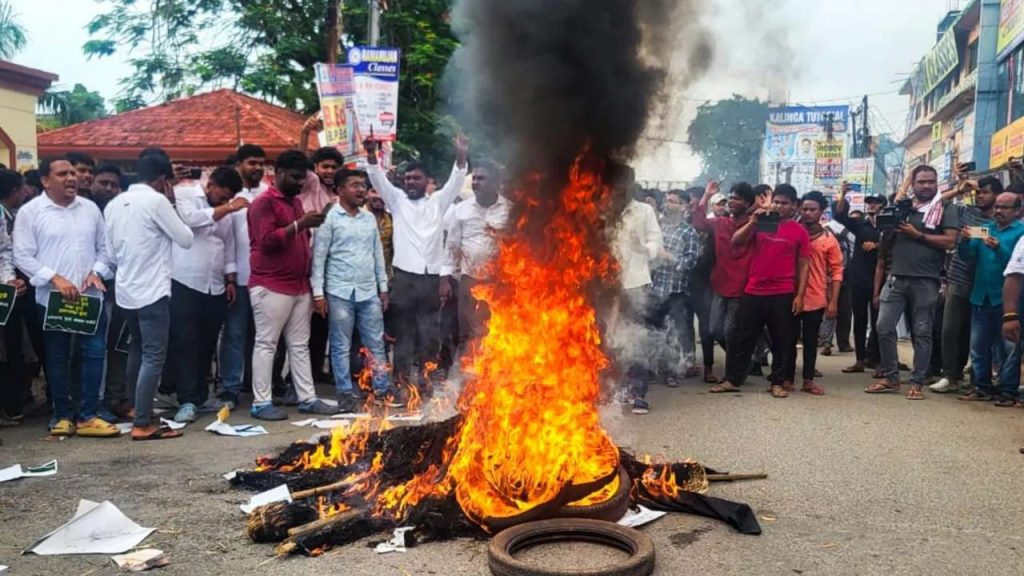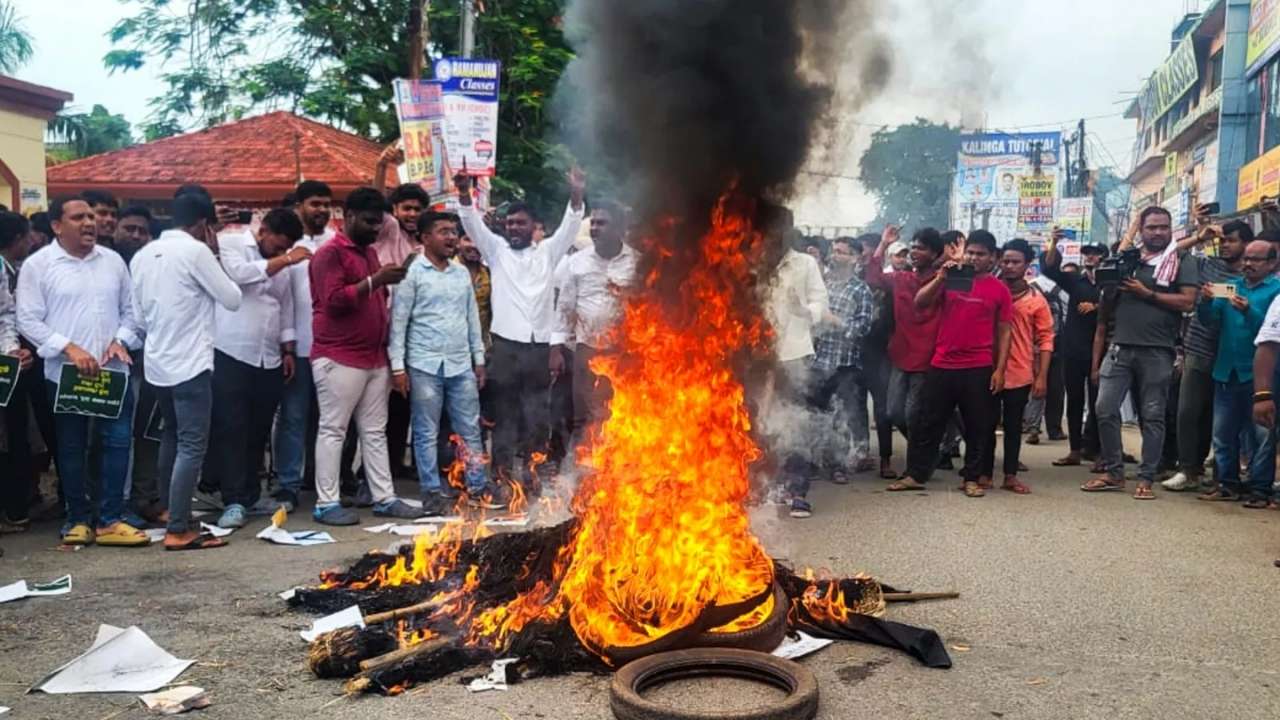In a heartbreaking turn of events, a young college student from Odisha, India, tragically lost her life after setting herself on fire, allegedly due to unresolved sexual harassment claims. Eleven days before her self-immolation, the 20-year-old student had warned the authorities and her college about her intentions. This act of despair drew attention to critical issues in the education system, especially concerning how harassment complaints are handled and the need for timely intervention. Let’s dive into this tragic case, explore its wider implications, and understand how we can take proactive steps to prevent similar incidents in the future.

11 Days Before Tragic Self-Immolation
| Key Event | Details |
|---|---|
| Student’s Warning | The student wrote to her college’s Internal Complaints Committee (ICC), raising allegations of sexual harassment and stating she would commit suicide if her complaints weren’t addressed. |
| The Incident | On July 14, the student passed away after succumbing to 95% burns at AIIMS Bhubaneswar, following her self-immolation. |
| College and Government Response | The accused faculty member and college principal were arrested, and an investigation was launched by the Odisha government. |
| Public Outrage | Widespread protests erupted, with political parties demanding justice and accountability. |
| Calls for Reform | The incident sparked nationwide debate on the need for better handling of harassment cases in educational institutions. |
For more information on support and crisis intervention, visit the official National Suicide Prevention Lifeline.
The tragic death of the Odisha student is a reminder that we must do more to protect those who are vulnerable in educational institutions. We must create environments where students feel safe to speak up, and where their voices are heard and acted upon. This case highlights a systemic failure that demands our attention. It is not just about punishing those responsible; it’s about ensuring that this kind of tragedy doesn’t happen again.
As a society, we must take a proactive stance on harassment, create better reporting mechanisms, and support students in need. Only then can we ensure that no one else has to face such a tragic fate.
Introduction: The Tragic Incident
On July 14, a 20-year-old student from Fakir Mohan Autonomous College in Balasore, Odisha, passed away from injuries sustained after setting herself on fire. The student had earlier warned about her intentions, sending a letter to the college authorities, making it clear that if her harassment complaints were ignored, she would take drastic measures.
The incident has raised serious questions about the safety of students in educational institutions, particularly the handling of sexual harassment complaints. Despite the student’s clear warning and public plea for help, the institution failed to act swiftly or empathetically, leading to an outcome no one could have foreseen—her tragic death.
Context: What Led to the Tragedy?
The student had been pursuing an integrated B.Ed. course at Fakir Mohan Autonomous College and was subjected to alleged sexual harassment by a senior faculty member. According to the reports, the accused faculty member, Samir Kumar Sahu, had made unwanted advances toward the student, threatening her academic progress if she didn’t comply. The student attempted to report the matter to the college’s Internal Complaints Committee (ICC) but received no immediate response.
In the letter she sent to the college’s ICC, the student made it clear that if no action was taken, she would end her life. She repeated this grim warning in a social media post, tagging government officials and demanding justice. Despite her clear plea, the harassment continued, and no substantial action was taken by the college, leading to her desperate act of self-immolation.
Detailed Breakdown: What Happened and What Needs to Change
The Warning Signs: A Cry for Help
One of the most devastating aspects of this case is the fact that the student reached out for help multiple times. Eleven days before the tragedy, she sent a detailed letter to the college’s Internal Complaints Committee (ICC), describing the harassment and threatening to commit suicide if the issue was not resolved. She also took to social media, using X (formerly Twitter) to publicly share her complaints and reiterate the threat to end her life if justice wasn’t served.
Her message was clear: She felt helpless and abandoned. She was pleading for help—she didn’t want to die, but she saw no other way out.
The College’s Response: A Critical Failure
Unfortunately, despite the student’s repeated warnings, the college administration did not take immediate and effective action. Reports indicate that the Internal Complaints Committee either did not act quickly enough or failed to address the issue with the seriousness it deserved. The accused faculty member, Samir Kumar Sahu, continued in his position, and no formal actions were taken to ensure the student’s safety.
This lack of timely intervention is where the system failed. When students come forward with complaints, especially those as serious as sexual harassment, institutions must prioritize their safety, dignity, and well-being. The failure to do so not only violates the rights of the student but also sends a dangerous message about the lack of accountability within academic institutions.
Political and Social Fallout: Protests and Public Outcry
Following the student’s tragic death, a wave of protests erupted across Odisha. Political parties, including the Biju Janata Dal (BJD) and Congress, voiced their outrage, demanding justice for the student and accountability for those responsible for neglecting her complaint. The protests called for systemic changes in how harassment cases are dealt with, not just in Odisha but across the entire country.
The incident also triggered a larger conversation about the role of educational institutions in ensuring student safety. A number of political parties and student organizations called for an Odisha bandh (statewide shutdown), showing solidarity with the student’s family and demanding reforms in how colleges and universities address harassment complaints.
Legal and Institutional Implications
In the wake of this incident, the Odisha government announced an investigation into the matter. The accused faculty member, Samir Kumar Sahu, and the college principal, Dilip Ghose, were both arrested for their alleged roles in failing to address the harassment claims properly.
This case highlights the need for stronger legal frameworks to address sexual harassment in educational institutions. Institutions must be required to follow strict protocols when handling such complaints. The Internal Complaints Committee (ICC) should have more power to take immediate action, and the safety of students must be the top priority.
Practical Advice: How Can We Prevent Such Tragedies?
1. Promote Awareness and Education
One of the most effective ways to combat harassment is by promoting awareness. Both students and faculty need to be educated about what constitutes harassment and the consequences it carries. Students should be encouraged to report inappropriate behavior, knowing they will be supported by the institution.
2. Strengthen Reporting Mechanisms
It is crucial that colleges and universities have robust and transparent reporting mechanisms. The student in Odisha did everything right—she reported the harassment, reached out to the ICC, and even took to social media to get attention. But when no action was taken, it shows a massive gap in the system. Institutions need to establish clear procedures for handling complaints, ensure the complaints are dealt with promptly, and offer emotional and legal support to the victims.
3. Empower Students with Resources
Students need to know that they have support systems in place. Colleges should provide access to counseling services, mental health support, and legal aid. Having a student-friendly approach can help them feel safe and heard.
4. Enforce Accountability
Institutions should be held accountable for their role in protecting students. Colleges and universities must be transparent in their investigation processes and be willing to take action when necessary. Harassment should never be swept under the rug, and anyone found guilty of enabling or ignoring it should face consequences.
5. Cultivate an Open Culture
Lastly, it is essential to create a culture in educational institutions that values openness, respect, and equality. Students should feel free to voice their concerns without fear of retaliation or further victimization.
FAQs
Q1: What should I do if I or someone I know is experiencing harassment?
If you are experiencing harassment, it is essential to report it immediately to the institution’s Internal Complaints Committee (ICC), a trusted teacher, or a counselor. You should also keep a record of any incidents, including dates and details. If the institution doesn’t take appropriate action, consider contacting legal authorities or organizations that specialize in sexual harassment cases.
Q2: How can educational institutions prevent harassment?
Educational institutions can prevent harassment by implementing strong anti-harassment policies, providing training to staff and students, establishing clear reporting procedures, and fostering a culture of respect and equality.
Q3: What can the government do to support victims of harassment?
The government can provide stronger legal frameworks for handling harassment cases, ensuring that institutions are held accountable for neglecting complaints. The government can also fund mental health services and provide training for educators to better respond to harassment.





